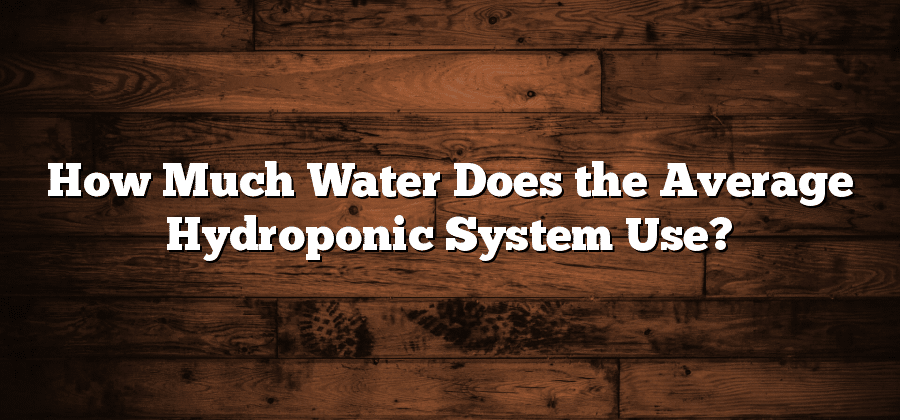Understanding Hydroponic Systems and Water Consumption
Hydroponic systems have gained significant popularity in the field of agriculture due to their ability to produce high-quality crops using minimal space and resources. One essential aspect to consider when it comes to hydroponic farming is water consumption. Unlike traditional soil-based farming, hydroponics relies on a precise and controlled delivery of water to nourish the plants.
Water plays a vital role in hydroponic farming as it serves as a medium to transport essential nutrients directly to the plant roots. Unlike in traditional soil farming, where plants extract water and nutrients from the soil, hydroponic systems require a continuous and accurate supply of water to maintain optimal conditions for plant growth. The water is carefully dosed with all the necessary nutrients, ensuring that plants receive the ideal amounts for their development. Controlling water consumption in hydroponic systems is crucial to maintaining the delicate balance necessary for successful crop growth. By understanding the factors that affect water usage and implementing efficient water management techniques, hydroponic farmers can maximize crop productivity while minimizing water wastage.
The Importance of Water in Hydroponic Farming
Water is a vital component in hydroponic farming, playing a crucial role in the successful cultivation of plants. Unlike traditional soil-based farming, hydroponics relies on a carefully controlled water system to provide plants with the necessary nutrients and hydration they need to thrive. In this innovative method of farming, water acts as the medium through which essential nutrients are delivered directly to the plants’ roots, eliminating the need for soil.
One of the key advantages of hydroponic farming is its efficient use of water. Unlike conventional farming, where a significant amount of water is lost through evaporation and runoff, hydroponics allows for a more precise and targeted approach to watering crops. By recycling and reusing the water within the system, hydroponic farmers can reduce water consumption by up to 90% compared to traditional farming methods. This not only conserves a precious resource but also makes hydroponics a sustainable farming solution for regions facing water scarcity or drought conditions.
Factors Affecting Water Usage in Hydroponic Systems
Factors Affecting Water Usage in Hydroponic Systems
One of the primary factors that affect water usage in hydroponic systems is the type of crop being grown. Different plants have varying water requirements, and this can significantly impact the amount of water needed in the system. For example, leafy greens such as lettuce and spinach generally require more water compared to root crops like carrots or beets. Additionally, the growth stage of the plants also plays a role in water consumption. Young plants require less water compared to mature ones, so growers need to consider the crop’s growth stage when determining water usage.
Another factor influencing water usage in hydroponic systems is the type of hydroponic system being used. There are several different types of hydroponic systems, including nutrient film technique (NFT), deep water culture (DWC), and drip irrigation, among others. Each system has its own water management characteristics, which can affect the amount of water needed. For instance, NFT systems typically use a thin film of water flowing over the roots, resulting in lower water consumption compared to DWC systems where the roots are fully immersed in water. Consequently, understanding the water requirements of the chosen hydroponic system is crucial for efficient water management in hydroponic farming.
Factors such as the type of crops being grown and the hydroponic system employed play significant roles in determining water usage in hydroponic systems. By carefully considering these factors, growers can optimize water management practices and ensure sustainable production in their hydroponic farms.
Calculating Water Requirements for Hydroponic Crops
To determine the water requirements for hydroponic crops, several factors need to be taken into consideration. One crucial factor is the type of crop being grown. Different crops have varying water needs, and it is essential to understand the specific requirements of each plant. Some crops, such as lettuce and herbs, have higher water demands, while others like tomatoes and cucumbers require less. By researching the water requirements of different hydroponic crops, growers can ensure they are delivering the appropriate amount of water to each plant.
Another factor to consider when calculating water requirements is the growth stage of the plant. Young plants typically need less water compared to mature ones. As the plants grow, their water requirements increase to support their development and nutrient uptake. Therefore, it is essential to monitor the growth stage of the crops and adjust the water supply accordingly. Additionally, the size and density of the crop’s root system should be taken into account as it affects water absorption and transpiration rates.
Efficient Water Management Techniques for Hydroponic Systems
Efficient water management is crucial in hydroponic systems to ensure optimal plant growth and minimize water consumption. Implementing the right techniques can not only save water but also improve the overall efficiency of the system. One effective technique is using automated irrigation systems that deliver water directly to the plants’ root zone. By providing water at the precise dosage and frequency, these systems minimize water loss through runoff and evaporation, leading to significant water savings.
Another technique for efficient water management is the use of recirculating systems. In these systems, water is collected and reused, reducing the need for constant fresh water supply. By incorporating filtration and purification systems, any potential buildup of pathogens or contaminants in the water can be minimized, ensuring a healthy growing environment for the plants. Additionally, monitoring and adjusting the pH and nutrient levels in the recirculating water can optimize plant uptake, preventing wastage and promoting efficient water usage in hydroponic systems.
By implementing these efficient water management techniques, hydroponic farmers can not only decrease their water consumption but also improve crop yields and overall sustainability. Conserving water resources while maximizing productivity is essential for the future of hydroponic farming, as it helps to maintain a balance between agricultural needs and environmental stewardship.






